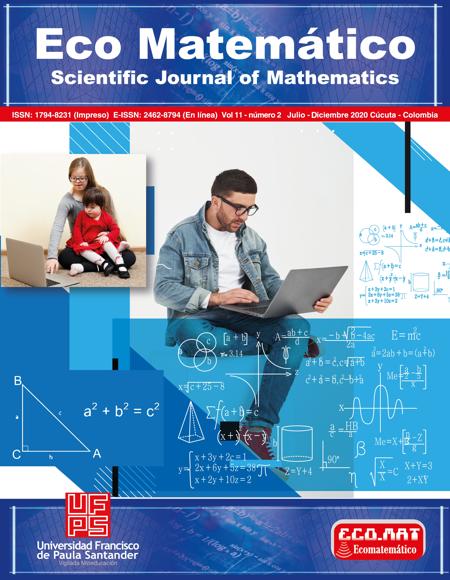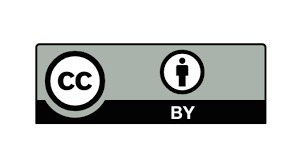Formación inicial docente en México: hacia una caracterización del conocimiento matemático inclusivo
Formación inicial docente en México: hacia una caracterización del conocimiento matemático inclusivo
Main Article Content
Teacher training is a relevant element in the training capacity of students to face the challenges demanded by today's society and also to attend to the education of students in vulnerable conditions. If we talk about the mathematics education of students with disabilities, the educational challenge is broad. For this reason, it reflects on the presence of inclusion in the training of mathematics teachers in Mexico; this through research that the authors have carried out on the study plans that form them. Also, more generally, the need to characterize inclusive mathematical knowledge is exposed; discussing before a possible interpretation of the notion of inclusion in mathematics education. The reflections generated from this review suggest that the presence of inclusion in the careers that train future mathematics teachers in Mexico is incipient. In addition to the need to establish a category of analysis for inclusive mathematical knowledge; here is a first approach to its structure. This Pacheco-Carrascal, N. (2016). La motivación y las matemáticas. ECO MATEMATICO, 7(1), 149–158 includes tasks for the development of mathematical thinking based on diversity in the classroom and teaching alternatives that recognize and identify the cognitive processes of children with disabilities. We consider that delving into this category could influence the curricula entrusted to train future mathematics teachers, taking into account the new policies of inclusive education in the world; This will contribute to the diversification of teaching processes, promoting an inclusive mathematics classroom.
Downloads
Article Details
Aké, L. P. (2016). Matemática educativa y educación especial: realidades y desafíos en la formación de profesores. En J. López y J. Cuevas (Eds.). Educación especial y matemática educativa. Una aproximación desde la formación docente y procesos de enseñanza (pp. 15-32). San Luis Potosí, México: CENEJUS
Aké, L. P., y Vargas, M. (2015). Los profesores de matemáticas y su formación. Reflexiones ante la inclusión educativa. En M. Vargas y N. Márquez (Eds.), Educación inclusiva. Una perspectiva de oportunidades (pp. 95-107). Colima, México: Universidad de Colima
Bagger, A., Roos, H., & Engvall, M. (2020). Directions of intentionalities in special needs education in mathematics. Educational Studies in Mathematics, 104, 41-63. < https://doi.org/10.1007/s10649-020-09945-4>
Bock, A., Siegemund, S., Nolte, M., & Ricken G., (2019). Preparation for Inclusive Teaching: Entangling Prospective Teachers´Perspectives on Inclusive Teaching Using Mathematics Education as an Example. En D. Kollosche, R. Marcone, M. Knigge, M. Godoy, & O. Skovsmose (Eds.), Inclusive Mathematics Education (pp. 585- 606). Suiza: Springer. < https://doi.org/10.1007/978-3-030-11518-0_33>
Booth, T., & Ainscow. M. (2002). Index for inclusion. Developing leaning and participation in schools (2ªed). Manchester: CSIE
Carrillo-Sierra, S. M. (2019). Inclusive education: conceptual and epistemological review. Perspectivas, 4(2), 13-19
Castro, W. F., Pino-Fan, L. R., y Parra-Urrea, Y. (2018). El modelo del conocimiento didáctico-matemático de los profesores: nuevas perspectivas y horizontes para la formación docente. RECME-Revista Colombiana de Matemática Educativa, 3(2), 17-25
Contreras, S., Garcia-Cedillo, I., Forlin, C., & Lomelí-Hernández, K. A. (2013). Preparing teachers for inclusion in Mexico: how effective is this process? Journal of Education for Teaching, 39(5), 509-522. https://doi.org/10.1080/02607476.2013.836340
Dolores, C. (2014). La formación profesional de los profesores de matemáticas. En C. Dolores, M. García, J. Hernández, L. Sosa (Eds.). Matemática educativa: la formación de profesores (pp. 13-25). Ciudad de México: Díaz de Santos
Elizarrarás, S. (2018). Similitudes del programa de estudios 1993 para cursos de matemáticas respecto al planteamiento curricular 2017. Revista Praxis Investigativa ReDIE, 10(9), 120-129
Esparza, L., y Jiménez, A. (2017). El aprendizaje del profesor de matemáticas como campo investigativo. Revista Historia de la Educación Latinoamericana, 19(28), 173-196. <https://doi.org/10.19053/01227238.6247>
Flores, V. J., y García, I. (2016). Apoyos que reciben estudiantes de secundaria con discapacidad en escuelas regulares: ¿corresponden a lo que dicen las leyes? Revista Educación, 40(2), 1-20. <http://dx.doi.org/10.15517/revedu.v40i2.15851>
Florian, L. (2010). Special education in the era of inclusion: The end of special education or a new beginning. The psychology of education review, 34(2), 22-27
Florian, L. (2015). Conceptualising inclusive pedagogy: The inclusive pedagogical approach in action. En J. M. Deppeler, T. Loreman, R. Smith, L. Florian (Eds.), Inclusive Pedagogy Across the Curriculum (pp. 11-24). Emerald Group Publishing Limited. <https://doi.org/10.1108/S1479-363620150000007001>
Florian, L., & Black-Hawkins, K. (2011). Exploring inclusive pedagogy. British Educational Research Journal, 37(5), 813-828. <https://doi.org/10.1080/01411926.2010.501096>
García-Cedillo, I. (2018). La educación inclusiva en la reforma educativa de México. Revista de Educación Inclusiva, 11(2), 49-62
García, I., y Romero, S. (2016). Avances de la integración educativa/educación inclusiva y la formación docente para la inclusión en México. Aguascalientes: CENEJUS-UASLP
García, I., Escalante, I., Escandón, M. C., Fernández, L. F., Mustri, A., y Puga, A. (2000). La integración educativa en la escuela regular. Principios, finalidades y estrategias. Fondo Mixto de Cooperación Técnica y Científica México- España
García, I., Romero, S., Aguilar, L., Lomelí, K., y Rodríguez, D. (2013). Terminología internacional sobre la educación inclusiva. Actualidades Investigativas en Educación, 13(1), 1-29. <https://doi.org/10.15517/aie.v13i1.11712>
Gervasoni, A., & Peter-Koop, A. (2020). Inclusive mathematics education. Mathematics Education Research Journal, 32(1), 1-4. https://doi.org/10.1007/s13394-020-00315-0
Granado, M. (2006). El contexto científico de la educación especial: bases psicológicas para el diseño y desarrollo de prácticas educativas adaptadas. Revista de Ciencias de la Educación, 13(11), 92-114
Hernández-Sánchez, J., Borjón-Robles, E. y Torres-Ibarra, M. (2016). Dimensiones de la tecnología en la formación inicial de profesores de matemáticas: un estudio desde el currículum oficial. Eco matemático, 7(1), 6-19. Cúcuta, Colombia
Hernández, J., y Dolores, C. (2018). El reconocimiento del campo académico de la matemática educativa. En M. A. Campos (Ed), Discurso, representaciones y conocimientos en el campo de matemática educativa (pp. 267-318). México: ISSUE UNAM
López-Mojica, J. M., Aké, L. y Hernández, J. (en prensa). Pensamiento matemático para la educación inclusiva. Una aproximación desde matemática educativa. En R. Pérez (Eds.). Educación Inclusiva en el Contexto Mexicano. México: CENEJUS
Murillo, F. J., y Duk, C. (2018). Una investigación inclusiva para una educación inclusiva. Revista Latinoamericana de Educación Inclusiva, 12(2), 11-13. <https://doi.org/10.4067/S0718-73782018000200011>
Niño-Blanco, J., Hernández-Suárez, C. y Bonilla-González, M. (2019). Práctica pedagógica, dominio afectivo y procesos matemáticos de los docentes de matemáticas en el nivel de educación básica del sector público. Eco matemático, 10(1), 19-27. Cúcuta, Colombia
Ocampo, A. (2017). Epistemología de la educación inclusiva: un estudio sobre sus condiciones de producción y fabricación del conocimiento (Tesis de Doctorado). Universidad de Granada, España
Ocampo, A. (2018). Comprensión epistemológica de la educación inclusiva: discusiones analítico-metodológicas. Revista Espaço, 50, 21-43
Ocampo, A. (2018a). Comprensión epistemológica de la Educación Inclusiva: constelaciones, movimientos, encuentros y plasticidades. En A. Ocampo (Ed.) Cuadernos de Educación Inclusiva Vol. II. Formación de Maestros e Investigadores para la Educación (pp. 181-297). Santiago de Chile, Chile: Centro de Estudios Latinoamericanos de Educación
Perrenoud, P. (2010). Diez nuevas competencias para enseñar. España: Grao
Pineda, W.B., Hernández, C. A., y Rincón, O. L. (2019). Estrategias para la enseñanza de la matemática: una mirada desde los docentes en formación. Perspectivas, 4(1), 48-53
Prato, J., Hernández, V., Fuentes, M., y Gamboa, A. (2018). Análisis de las técnicas de enseñanza-aprendizaje para la elaboración de un protocolo terapéutico en infantes escolarizados con Síndrome de Down. Perspectivas, 3(1), 85-101
Rincón-Alvarez, G. A., Prada-Núñez, P., y Fernández-Cézar, R. (2019). ¿Se relacionan las creencias sobre las matemáticas con el rendimiento académico en matemáticas en estudiantes de contexto vulnerables? Eco matemático, 10 (2), 6-15. Cúcuta, Colombia
Rivera, D., Carrillo, S. M., Silva, G., y Galvis, L. N. (2019). Conocimiento y práctica pedagógica de los docentes en escolares con inatención, hiperactividad e impulsividad. Perspectivas, 4(1), 66-76
Rojas-Ferreira, R. (2016). Aproximación a las Discapacidades Específicas de Aprendizaje en la competencia Matemática en el contexto educativo colombiano. Eco matemático, 7(1), 121-140. Cúcuta Colombia
Romero, S., y García, I. (2013). Educación especial en México. Desafíos de la educación inclusiva. Revista Latinoamericana de Educación Inclusiva, 7(2), 77-91
Roos, H. (2015). Inclusion in mathematics in primary school. What can it be? (Tesis de doctorado). Linnaeus University, Suecia
Sánchez, M. (2011). A review of research trends in mathematics teacher education. PNA, 5(4), 129-145. Recuperado de http://funes.uniandes.edu.co/1722/1/Sanchez2011AReview.pdf
Scherer, P (2019). Professionalization for Inclusive Mathematics Education: Challenges for Subject-Specific Teacher Education. En D. Kollosche, R. Marcone, M. Knigge, M. Godoy, & O. Skovsmose (Eds.), Inclusive Mathematics Education (pp. 625- 638). Suiza: Springer. <https://doi.org/10.1007/978-3-030-11518-0>
Secretaría de Educación Pública-SEP (2016). El modelo educativo 2016. México: SEP
UNESCO (1994). The Salamanca Statement and Framework for Action on Special needs Education. Paris: UNESCO
Valero, P. (2010). Mathematics education as a network of social practices. In V. Durand-Gueier, S. Soury-Lavergne, & F. Arzarello (Eds.), Proceedings of the Sixth Congress of the European Society for Research in Mathematics Education (pp. LIV–LXXX). Lyon: Institut National de Recherche Pedagogique. Recuperado de https://vbn.aau.dk/en/publications/mathematics-education-as-a-network-of-social-practices







